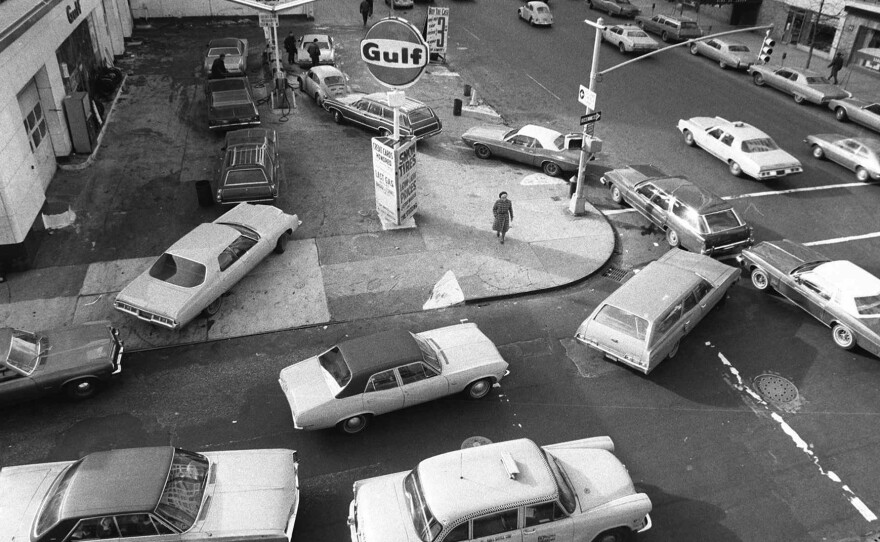The Federal Reserve is being blamed for pouring a lot of cold water on the U.S. economy.
But the Fed is doing it in the hopes of dousing high inflation, before it ignites a long-smoldering dumpster fire. "The longer the current bout of high inflation continues, the greater the chance that expectations of higher inflation will become entrenched," Fed chairman Jerome Powell said last week.
It's a lesson born of the country's painful experience with runaway prices in the 1970s, when Americans sported "Whip Inflation Now" buttons on their wide lapels.
"I came of age and studied economics in the 1970s and I remember what that terrible period was like," Treasury Secretary Janet Yellen told a House subcommittee last year. "No one wants to see that happen again."
Yellen and Powell initially misjudged the staying power of inflation. They believed it was the temporary product of supply shocks tied to the pandemic and pent-up demand from consumers and that prices would quickly settle down again. Instead, prices have continued their rapid climb for a year and a half.
Now, Powell is determined to snuff out inflation with higher interest rates and avoid the kind of decade-long price spiral that haunted presidents from Richard Nixon to Jimmy Carter.
The 1970s were bookended by oil shocks that brought soaring prices for gasoline. Meat prices also spiked. On the popular sitcom All In The Family, Archie Bunker was reduced to eating meatless spaghetti.

Prices actually started creeping up in the mid-1960s, when the federal government was spending heavily on both the Vietnam War and the Great Society. Nixon temporarily froze prices in the early 1970s, but that just postponed the pain. When his controls were lifted, prices bounced even higher.
Gerald Ford declared inflation "Public Enemy Number One." Carter called it the nation's most pressing domestic problem.
Despite the tough talk from the White House, prices kept climbing.
Princeton economist Alan Blinder says psychology was partly to blame. In the 1970s, Americans came to believe that high inflation was here to stay. And that expectation became a kind of self-fulfilling prophesy.
"If you're a business and you expect the inflation rate to be 5%, you're likely when it comes time to set the prices for the next year [to] go up 5%," said Blinder, who was vice chairman of the Federal Reserve in the 1990s.
"On the other hand, if you think inflation is going to be 1%, you're more likely to go up 1%," he added.
Ultimately, it took a crackdown by cigar-chomping Fed chairman Paul Volcker to break the cycle of rising prices and wages. Volcker slammed the brakes on the economy by raising interest rates to 20% — tough medicine to prove he was serious about getting inflation under control.
"At some point this dam is going to break and the psychology is going to change," Volcker told the MacNeil/Lehrer NewsHour.
It worked. By 1983, inflation had retreated to just over 3%.
It was a painful correction. Nearly 4 million people lost jobs in back-to-back recessions in the early 1980s. But for the next four decades, inflation was not a serious problem in the U.S. — until the pandemic struck, followed by the war in Ukraine.
In June, the annual inflation rate hit 9.1% — the highest since the early 1980s. The Fed has responded by raising interest rates five times this year, in an effort to tamp down demand and bring prices back under control.
"The record shows that if you postpone that, delay is only likely to lead to more pain," Powell told reporters last week.
One thing that's working in the Fed's favor is that high inflation is not yet baked in to most people's thinking, the way it was in the 1970s. Surveys show most people expect prices to level off again in the coming years.
"If people believe that prices will be pretty stable, then they will be — because they won't ask for very high wage increases and people who sell things won't be asking for high price increases," Powell told Morning Edition. "Once that psychology sets in, it tends to perpetuate itself."
Blinder agrees the decades of stable prices since the 1970s should help to prevent another inflationary spiral in the future.
"I think the generation that were adults in that high-inflation period will always remember it," Blinder said. "But there are a lot of Americans that never lived with inflation at all. So naturally, they don't expect it."
Copyright 2022 NPR. To see more, visit https://www.npr.org. 9(MDAzMjM2NDYzMDEyMzc1Njk5NjAxNzY3OQ001))







